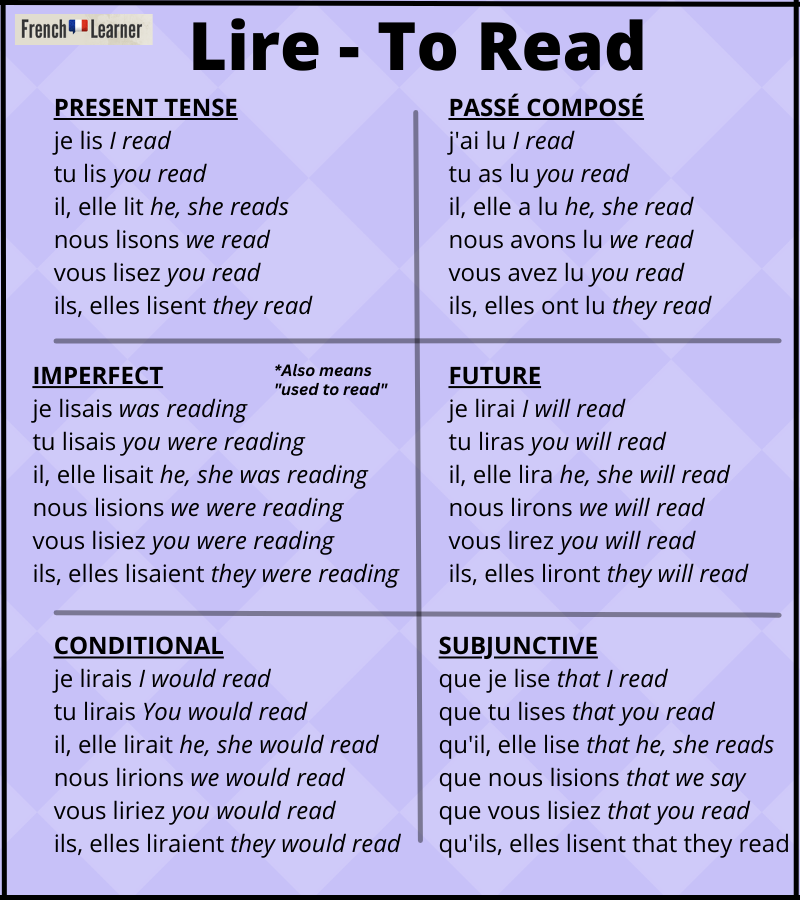Conjugation tables for lire (to read) in French
The conjugation of lire (Meaning: to read in French) is: Je lis (I read), tu lis (you read), il, elle lit (he, she reads), nous lisons (we read), vous lisez (you read) and ils, elles lisent. This page contains conjugations charts for lire in seven major verb tenses.

Lire is an irregular -re verb. That means that its endings in the present tense are different from all other regular-re verbs.
The past participle of lire is lu (read) and the present participle is lisant (reading).
This page provides verb tables of faire in the following tenses:
- Present tense (le présent)
- Compound past (passé composé)
- Imperfect (l’imparfait)
- Simple future (le futur simple)
- Conditional (le présent du conditionnel)
- Present subjunctive (le subjonctif)
- Imperative (l’impératif)
Lire conjugation table

Lire conjugation charts
Present tense (le présent)
In the present tense, je lis translates to both “I read” and “I am reading”.
| Je lis | I read | Je lis le journal tous les jours. | I read the newspaper everyday. |
| Tu lis | You read (informal, singular) | Tu lis une histoire à tes enfants. | You read a story to your kids. |
| Il, elle lit | He, she reads | Elle lit le manuel scolaire pour le cours de chimie. | She reads the textbook for chemistry class. |
| Nous lisons | We read | Nous les toutes les conjugaison des verbes. | We read all the verb conjugations. |
| Vous lisez | You read (formal, plural) | Vous lisez les instructions du professor. | You read the teacher's instructions. |
| Ils, elles lisent | The read | Ils lisent les mots écrits sur le tableau noir. | They read the words written on the chalkboard. |
The following video teaches the pronunciation of lire in the present tense:
Compound past (passé composé)
The French use the passé composé to express actions which occurred at defined times.
| J'ai lu | I read | J'ai lu l'histoire à mes enfants. | I read the story to my kids. |
| Tu as lu | You read (infomral, singular) | Est-ce que tu as lu les petits caractères? | Did you read the fine print? |
| Il, elle a lu | He, she read | Elle a lu le contrat. | She read the contract. |
| Nous avons lu | We read | Nous avons lu l'article dans le journal. | We read the article in the newspaper. |
| Vous avez lu | You read (formal, plural) | Vous avez lu les paroles de la chanson. | You read the song lyrics. |
| Ils, elles ont lu | They read | Ils ont lu la Constitution américaine. | They read the constitution of the United States. |
Imperfect (l’imparfait)
The French use the imperfect tense to describe past events which occurred at undefined times.
| Je lisais | I was reading, used to read | Je lisais un roman quand le téléphoné à sonné. | I was reading a novel when the phone rang. |
| Tu lisais | You were reading, used to read (informal, singular) | Tu lisais des bandes dessinées quand tu étais un enfant. | You used to read comics when you were a child. |
| Il, elle lisait | He, she was reading, used to read | Elle lisait une revue quand papa est rentré à la maison. | She was reading a magazine when dad came home. |
| Nous lisions | We were reading, used to read | Avant, nous ne lisions pas les nouvelles en ligne. | Before we didn't used to read news online. |
| Vous lisiez | You were reading, used to read (formal, plural) | Qu'est-ce que vous lisiez quand vous étiez jeune? | What did you used to read when you were young? |
| Ils, elles lisaient | They were reading | Ils lisaient les mangas quand ils étaient au Japon. | They used to read mangas when they were in Japan. |

Simple future (le futur simple)
In the simple future tense, je lirai translates to “I will read”.
| Je lirai | I will read | Je lirai quelques articles avant de me coucher. | I'll read a few articles before going to bed. |
| Tu liras | You will read (informal, singular) | Tu liras quelques bons livres cette année. | You'll read a few good boos this year. |
| Il, elle lira | He, she will read | Elle lira un conte de fées à son fils. | She'll read a fairy tale to her son. |
| Nous lirons | We will read | Nous lirons la partition avant de jouer la chanson. | We'll read the sheet music before playing the song. |
| Vous lirez | You you read (formal, plural) | Vous lirez des documents très importants. | You'll read some important documents. |
| Ils, elles liront | They will read | Ils liront toutes les conjugaison des verbes. | They'll read all the verb conjugations. |
Conditional (le présent du conditionnel)
The French use the conditional tense to express hypothetical actions. Je lirais translates to “I would read”.
| Je lirais | I would read | Je lirais plus de livres si j'avais plus de temps. | I'd read more books if I had more time. |
| Tu lirais | You would read (informal, singular) | Tu lirais le mode d'emploi si tu avais plus de patience. | You'd read the instructions if you had more patience. |
| Il, elle lirait | He, she would read | Il lirait les ingrédients s'il avait ses lunettes de lecture. | He'd read the ingredients if he had his reading glasses. |
| Nous lirions | We would read | Nous lirions le texte mais c'est trop ennuyeux. | We'd read the text but it's too boring. |
| Vous liriez | You would read (formal, plural) | Vous liriez les paroles de la chanson si vous aviez une bonne connection internet. | You'd read the song lyrics if you had a good internet connection. |
| Ils, elles liraient | They would read | Ils liraient aux enfants s'ils avaient plus de temps. | They'd read to their kids if they had more time. |
Present subjunctive (le subjonctif)
The French use the subjunctive mood to express wishes, emotions and doubts. Que je lise translates to “that I read”.
| que je lise | that I read | Il faut que je lise ce roman. | I have to read this novel. |
| que tu lises | that you read (informal, singular) | Je veux que tu lises le mode d'emploi. | I want you to read the instructions. |
| qu'il, elle lise | that he, she reads | Je doute qu'il lise les petits caractères. | I doubt he's reading the fine print. |
| que nous lisions | that we read | Il faut que nous lisions cette histoire. | We have to read this story. |
| que vous lisiez | that you read (formal, plural) | J'exige que tu lisiez tous les détails. | I demand that you read all the details. |
| qu'ils, elles lisent | that they read | Je souhaite qu'ils lisent toutes ces conjugaisons. | I wish that they read all these conjugations. |
Imperative (l’impératif)
The French use the imperative mood to give commands. “Lisez!” translates to “read!”.
| Lis! | Read! (informal, plural) | Lis tous les mots! | Read all the words! |
| Lisons! | Let's read! | Lisons le livre ensemble! | Let's read the book together! |
| Lisez! | Read! (formal, plural) | Lisez le roman! | Read the novel! |


